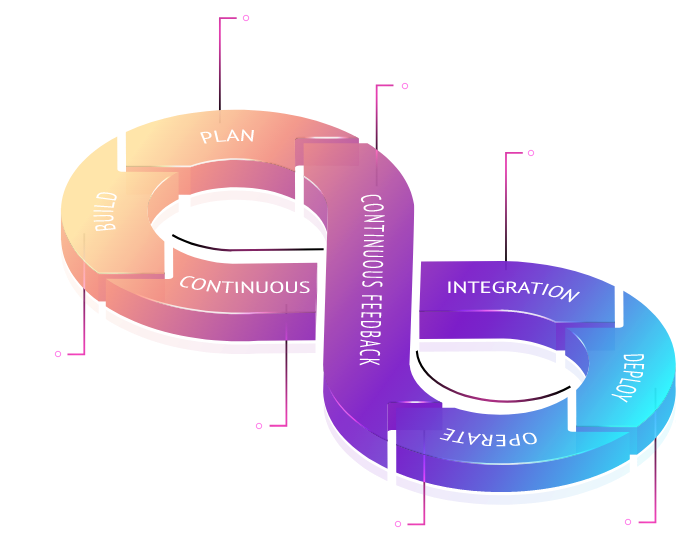AWS-DevOps Training
CloudZenix is Recognised as the Market Leader in providing the training of DevOps courses. Our "Software Development and IT operations Team" comprises leading DevOps Professionals, who on average have more than 10 years of industry recognized work experience with DevOps practices, they will help you to learn tasks such as developing life cycle and providing continuous delivery with high software quality. Our instructors have developed unique teaching methodologies to help the aspiring candidates to master the skills and knowledge of successfully establishing communication between Software Development and IT Operations to run continuous software development process.


DevOps Training Courses Overview
Cloudzenix's DevOps training program will provide you with in-depth knowledge of various DevOps tools, including Git, Jenkins, Docker, Ansible, Terraform, Kubernetes, Prometheus and Grafana. This DevOps certification course is entirely hands-on and designed in a way to help you become a practitioner through best practices in Continuous Development, Configuration Management, Continuous Integration and finally, Continuous Monitoring of software throughout its development life cycle
What is DevOps ?
DevOps (Development Operations) is a combination of Software Development and IT Operations. In DevOps, Software Development and IT Operations are two separate entities that co-exist. DevOps focuses on bringing these together to improve communication and increase productivity in the organisation. This unique combination allows an organisation and IT department to continually deliver quality value in the face of continually changing requirements. The objectives of DevOps are to increase the ability to provide the product and improving reliability while reducing inefficiencies, as well as satisfying their customer by providing the best services. DevOps follows the simple process such as plan, develop, deliver and operate phases.

DevOps Tools

Why Enroll For DevOps Training ?
Why Enroll With Us For DevOps Training
How Cloudzenix Training is different from others
Dedicated Scrum Master to track Daily Progress
Confluence page access for complete DevOps knowledge base
Complete office environment for real time experience
Access to JIRA Ticketing toll for real time office environment exposer
Weekly Demo Sessions of tasks completed
Course Contents
- Need of DevOps
- Devops Transition
- Technical challenges
- DevOps Market trends
- Devops Tools in Market
- CI-CD overview
- Architecture and Filesystem of Linux
- Linux Bash Commands
- Services, User & Group management
- Sed, Awk, Cut, Find, echo, printf, cron etc
- Loops - while, ForLoop
- Shell scripting
- Networking & OS management
- Source Code Management using GitHub UI
- History & Need of Version Control
- Centralized VS Distributed version control system
- Github CommandLine
- Cloning, Commit, Forking, MergeReBase, Pull Request, GitDiff, Logs
- Exposure to CherryPick
- Downloads dependencies from central repository.
- Builds project from source code.
- Runs tests and generates reports.
- Packages code into JAR or WAR files.
- Installs artifacts into local/remote repository for reuse.
- Jenkins - Installation
- Jenkins Configuration.
- Jenkins - Management
- Jenkins - Setup Build Jobs
- Integration of JENKINS with GIT
- Integration of Maven with Jenkins
- Jenkins Dashboard
- Remote Builds and user management in Jenkins • Exposure to backup & Jenkins Security
- Build Tools - Maven & exposure to Gradle
- Pipelines
- Git, Jenkins and Maven Integration
- Fundamentals of Cloud Computing
- AWS introduction
- IAAS, SAAS, PAAS
- EC2, AMI, Securitygroups, Keypair, S3, Public, Elastic IP
- IAMRoles, Cloudwatch
- VPC: Segreatting public, private infrastructure
- Introduction to ASG, ELB, EKS
- Understanding Infrastructure As A Code
- What is Terraform
- JSon templates
- Managing infrastructure using Terraform
- Multiple modules
- Integrating Terraform with AWS Update existing templates
- Understanding Configuration Management
- Understanding Configuration Automation
- Understanding Desired State Configuration Management
- Understanding Continuous Configuration Automation
- Understanding Server Client based Configuration Automation
- Understanding Remote Configuration Automation
- Introduction to Ansible tools
- Ad Hoc commands and Modules
- Yaml templates
- Playbooks
- Understanding MicroServices
- Introduction to Docker & Containers
- Working with containers
- Docker CLI
- Dockerfile templates
- Docker Hub - Repo, Push, Pull
- What is Kubernetes and Need
- Technical overview of Control Plane & Data Plane
- Kubernetes cluster provisioning using minicube
- POD Deployment, ReplicaSet, Nodes, DaemonSets, InitContainers
- Command & Args
- Multi Master architecture and exposure Scaleln/ScaleOut Ad Hoc on Demand of Microservices
- Services Secret, ConfigMap, Volumes, PVC, PV, StorageClass
- Virtualized infrastructure monitoring
- Installation & maintenance
- Exposure to Prometheus & Grafana
Project -1 : Infrastructure build using AWS for Cloud, Bitbucket for Source code management, Terraform For provisioning, Ansible for Config management and Jenkins for CI/CD.
Project -2 : Build and Deployed A sample spring boot application to kubernetes cluster using Jenkins pipeline.
Project -3 : Scraping Metrices from a sample application and monitoring it with prometheus and grafana.

What are the Principles of DevOps?
There are various principles of DevOps, but more promising are:
✅ Collaboration : DevOps works with the collaboration between two departments, Software Development and IT Operations. This combination helps to deliver the quality value to the organisation.
✅ Quantification : It is crucial to have a scale on by which the practices and its effects can be judged. By measuring the numbers of placements, failed attempts, the period of each placement, and completion time, before implementing DevOps. You can effectively calculate the effect and development of DevOps in a work environment and culture.
✅ Automation : By incorporating an equal level of automation in both development and operations departments, a class of effectiveness and stability can be accomplished through the board.
✅ Holistic : It is a method which means to think regarding the whole system and the ecosystem by which it is covered.
Why is DevOps used?
DevOps aims to increase the ability to deliver the product at a faster rate, by reducing inefficiencies, improving customer satisfaction, improving service, as well as improving reliability. There are many other reasons which are the main reasons why DevOps is widely used, such as:
- Predictability : During new releases, DevOps reduce the risk of failure.
- Reproducibility : It allows you to restore previously released versions at any time.
- Maintainability : DevOps offers seamless recovery during any new release crash or disabling the current system.
- Time to market : It effortlessly reduces the software delivery time up to 50%.
- Greater Quality : Teams can easily improve the application development quality as DevOps includes infrastructure issues.
- Resiliency : The operational state of the software system is more stable, secure, and changes are auditable.
- Cost Efficiency : Software development process can be cost-effective using DevOps, and allows IT companies to save money and increase profit.


Why is DevOps Needed?
- DevOps reduces risks, increases predictability, shorten development time, and helps to remove issues promptly whenever they appear. Prime reasons why DevOps is needed.
- It solved the problems of working isolated, those were felt both in development and operations teams.
- After design-build, software testing and deployment were consuming more time as it was done isolated.
- DevOps solved the issue of overtime consumption which was faced by teams during testing, deploying, and designing. It helps teams to focus on project development.
- It solved human errors in production which were made due to manual code deployment.
- DevOps solved the problem of delayed delivery of coding and operations teams, which were caused by different times.
- Due to these main reasons, DevOps is needed while working on any project as it solves various common and significant problems faced by organisations.
New DevOps Training Batch Starts In
©2023. CloudZenix All Rights Reserved.



